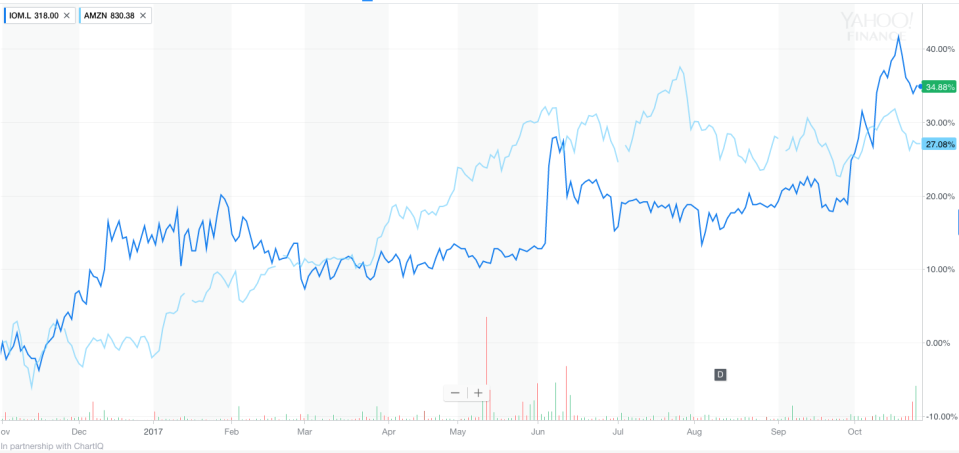Why investors should pay attention to these lesser-known tech stocks

Investors will remember only too well the hype and irrational valuations that were attached to tech stocks on both sides of the Atlantic between 1998 and 2000.
An array of household technology companies came on to the market with infectious enthusiasm and rose like the proverbial grilse in value, with telecom and media companies joining in all the fun of the fair – affectionately known as the TNT bubble or ‘dot-com’ boom. Though it might be superfluous to requirement to list copious names that entered the fray for ambitious investors, it might be as well to remember a few of the leading dramatis personae.
In 2000, the NASDAQ Composite started at 6828 and finished 2002 at 1598 – down 76%. The FTSE 100, though only having a few tech component stocks, though plenty of telecoms and media operations started in 2000 at 6930 and finished 2002 at 3940 – down 43%.
MORE: The graphs that Donald Trump isn’t tweeting
From the NASDAQ there were such names as Amazon, Cisco Systems, Qualcomm, Intel, Research in Motion and Texas Instruments to conjure with. During that two-year period Amazon fell from $107 to $7, with Cisco losing 86% in value, with the likes of Qualcomm all but trashed out of existence. The list was endless. Who can forget WorldCom and Tyco, whose respective CEOs, Bernie Ebbers and Denis Kozlowski spent time in state penitentiaries for fraud? Apple, at that time, had yet to get its act together under Steve Jobs.

Their UK counterparts were not quite the household names, apart from ARM Holdings, sold last year to Japan’s Softbank for £24 billion, Autonomy, sold in a very controversial manner to Hewlett-Packard for $8 billion in 2011 and Sage Group, still a constituent stock in the FTSE 100. Investors will recall the following names with mixed emotions – QXL, Freeserve, Baltimore, Bookham, Logica, CMG plus copious other operations caught up in paying a healthy premium for the frothy euphoria of tomorrow’s jam! Europe’s largest tech index Germany’s Neuer Markt ceased trading in 2001, with many investors having the skin metaphorically ripped off their face.
Technology recovered steadily in the next decade. However valuations in this sector have risen substantially over the last couple of years with many of the names fully valued. However, there are some good growth stocks in the UK, in areas that have excellent trends as a tailwind.
MORE: How to make money the guilt-free way
Panmure’s Peter McNally tells me that Iomart Group continues to benefit from the move to the cloud computing. Despite the share price being only slightly higher than it was four years ago, Iomart has doubled revenue and profits (both pre-and-post tax) and seems to have settled into a consistent level of high single digit organic growth, complemented by acquisitions, which has led to mid-teens growth in both revenue and profits. We think this company will continue to perform with aplomb.

For those with a taste for higher risk, we think Wandisco has the chance to outperform in the next six months – also benefitting from the continued shift to cloud computing and the proliferation of big data. While the shares have been a rollercoaster since listing in 2012, it introduced a newer product that addresses a broader addressable market for data replication, used when moving a company’s operations to the cloud and for processing big data workloads.
IBM has jumped on board as a reseller who will sell it as part of IBM branded analytics and storage products focused on big data and hybrid cloud. The company receives a royalty payment for this, which is 100% gross margin and therefore drops to the bottom line. Deal sizes have been rapidly increasing and we think this is likely to continue.
MORE: How the economy would react to a Corbyn government
In the area of digital marketing automation, which continues to be strong, Panmure likes dotDigital. They are a UK home grown company that has done exceptionally well in the domestic market, with options to grow internationally. While it competes against some larger companies overseas, it has an Apple-like approach to products making them appealing and easy to use.
Recent results showed North America grew 36% and APAC up 156%. Combined these are were only 14% of total revenue but we think the US will accelerate in the year ahead comes on top of an expectation of healthy growth for Europe (including UK) of 20%+. This compares to 19% growth in revenue and 32% growth in EPS last year. Recurring revenues are 81% of its total as new customers are signed up and existing ones spent more – in fact, 24% more last year to £715/month. This is a company to stay on the right side of.
As for North America, McNally thinks Amazon will continue to offer great opportunities – retail speaks for itself, but it is the Amazon Web Services business that he think is more interesting in terms of earnings and is also benefitting in the shift in computing architecture to the cloud.
It’s growing at over 40% per year as a standalone business and without it Amazon would not be profitable. In fact, it has twice the operating profitability that the North America division (International is still loss making). AWS is by far the leader in the public cloud segment with an estimated market share of 34% compared to Microsoft with 11%, IBM 8% and Google with 5% as of Q2’17. Growth looks set to continue as does profit generation.

 Yahoo Finance
Yahoo Finance 
